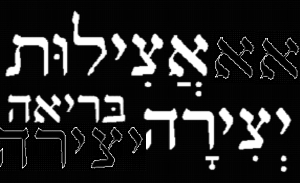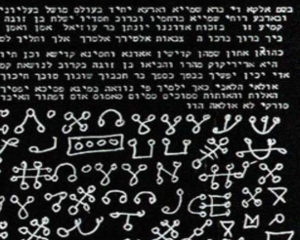 March 08
March 08
Is Kabbalah Mysticism? Continuing the Debate
by Shaul Magid and Boaz Huss
p. 3 of 3
"Paying Extra": A Response to Shaul Magid
by Boaz Huss
"That's a great deal to make one word mean," Alice said in a thoughtful tone.
"When I make a word do a lot of work like that." Said Humpty Dumpty, "I always pay it extra"
Lewis Carroll, Through the Looking Glass
I am grateful to Shaul Magid for his thoughtful response to my essay "Jewish Mysticism in the University: Academic Study or Theological Practice", which I hoped would stimulate reflection and discussion of the founding category of the academic field of "Jewish Mysticism", a category that many scholars in the field, including Magid, admit is ambiguous and hard, if not impossible, to define scientifically -- a statement which in itself gives sufficient reason to abandon its use in academic research.
 In his response, Magid attempts to "salvage the use of the term mysticism as both a heuristic and substantive lens through which we can understand kabbalistic literature in an academic context." While Magid offers interesting discussions of various topics in his essay, his attempt at salvage enhances, rather than refutes, my criticism of the use of the theological category "mysticism" in academic scholarship.
In his response, Magid attempts to "salvage the use of the term mysticism as both a heuristic and substantive lens through which we can understand kabbalistic literature in an academic context." While Magid offers interesting discussions of various topics in his essay, his attempt at salvage enhances, rather than refutes, my criticism of the use of the theological category "mysticism" in academic scholarship.
Magid questions two arguments which he claims I raised in my essay: "first that mysticism is, by definition, a theological category and second, that nomenclature foreign to a particular tradition should not be used to examine and explain such a tradition." As did Magid, I will address the second point first.
While in my essay I indeed asserted that mysticism is a theological category, I did not claim that only indigenous terms should be used in the study of a particular culture. Such a point is not only (as Magid admits), unstated in my article, but also runs contrary to my own statement that "I do not think academic scholars are obliged to exclusively use concepts and categories that have been used by the subjects of their studies." As to why I choose to direct my criticism to the term "Mysticism", and not to other terms such as religion, myth, symbol, ritual, Judaism and God, Magid's query is based on a wrong assumption: that I think that only emic terms should be used in academic research. I am happy to clarify that indeed many of the terms he mentioned deserve a critical analysis, and some of them, should not be used as analytic categories in academic research. This is especially true in regard to the term "religion", which, as several scholars have demonstrated, is based on theological assumptions. As to the use of the term "God" - this is exactly my point! Just as God (or for that matter, Allah, Jehovah, Shiva, Baal, the Divine Self, etc.,) cannot be used as an analytic category and an explanatory term in scientific discourse (in Natural Sciences as well as in the Humanities and Social sciences), so should we avoid the use of the term "mysticism" that refers to an encounter between human beings and a divine reality, as a descriptive and analytic term in academic research.
The reason why I choose to direct my critique on the category "mysticism", and not the other terms Magid mentioned, is (as I stated explicitly in my article) that "mysticism" has become the defining category of the academic study of Kabbalah and Hasidism (as well as some other Jewish cultural phenomena). As a scholar in a discipline which is usually defined as "Jewish Mysticism", I think the founding category of the discipline is the first to deserve critical reflection.
The main part of Magid's essay consists of a refutation of my argument that mysticism is a theological concept. As his discussion is based on a misreading of my argument, I will restate it. As I have shown in my essay in Zeek, as well as in my article "The Mystification of Kabbalah and the Myth of Jewish Mysticism" (Pe'amim 110, 2007; 9-30) the term "mysticism" has been used, since the 19th century, to describe and classify different artifacts and practices that are assumed to be descriptions, expressions, or products of an experience of an encounter between human beings and a divine, or transcendent, reality. In this framework, various Jewish cultural phenomena, foremost Kabbalah and Hasidism, were, and still are, classified, analyzed and studied as "Jewish Mysticism".
According to the definitions of the term mysticism that I have surveyed in my articles, the common denominator of the various mystical phenomena is that they are all dependent or related to an experience of an encounter with a divine/transcendent reality. As the existence of such a divine/transcendent reality is a theological position, which in my opinion should not be accepted in academic discourse, and as scholars have not offered any other viable common denominator(s) which are common to all the phenomena that are usually classified as "mystical", and only to them, I suggest we abandon the use of the category "mysticism" in academic research. By this, I do not mean a "politically correct" avoidance of the word mysticism, but rather, the much more difficult task of dissipating fundamental categories, accepted truisms and standard methods of study. My suggestion is to abandon the assumption that there is an essential affinity between Kabbalistic cultural productions and other so called "mystical" phenomena (both in Jewish and other cultures) and the discursive practices such an assumption entails.
In his response to my article, Magid seems to accept my observations concerning the genealogy of the term "mysticism" and its employment in academic studies. He also explicitly affirms my rejection of using theological assumptions in scientific research. Nonetheless, he rejects my conclusion that mysticism is an inadequate category, and suggests that "that there are various non-theological ways of understanding mysticism that may make such a term useful in describing kabbalistic literature."
In order to salvage the category of mysticism, Magid suggests that "mysticism" describes three very distinct dimensions of human experience: "the experience of reading religious myth whereby the reader enters into the myth of his own creation and becomes part of the imaginative narrative", "the experience of an “event” yielding a radical subjectification of the subject and his experience such that the event becomes the touchstone and exemplification of a universal philosophical truth that cannot be rationally proven" and "that mysticism (here more specifically the mystical experience of Moses) is an experience that by its very nature undermines the subject’s ability to function as a complete authority".
In order to clarify the dimensions of human experience that mysticism refers to and illustrate how mysticism can be a term that does not carry a theological agenda, Magid presents an interesting discussion of three texts written by 20th century thinkers. Although he argues that these examples do not make theological claims, Magid admits that they work under certain theological assumption. Two of the passages, who do not use the term "mysticism" at all, Alain Badiou's on St. Paul and Rabbi Kalonymous Kalman Shapiro of Piaszceno`s on Moses are explicit theological texts. The third passage, by Michael Fishbane, uses the term mysticism, and describes it as "spiritual components of a divine reality which the individual has internalized through the interiorization of the mythic dramas." Magid insists that "while it is true that Fishbane uses the term “divine reality” to describe the myth interiorized, he is not making a theological claim, that is, a claim about God." I beg to differ. Fishbane's assertion that cultural phenomena are explained by the assimilation and interiorization of "the modalities of the divine reality" is a theological and not a scientific claim. Furthermore, Magid's own statement concerning the "mystical dimension" that Moses could not transcend, and "the mystical source" of a commandment seem to refer to a divine or transcendent reality.
 The main problem with Magid`s redefinition of "mysticism" is that it involves a radical change of the standard referents of the term. The three dimensions of human experience which he describes as mystical can be applied to phenomena which are not usually described as such. Badiou and Shapiro discuss events that they do not perceive as "mystical" and Magid`s few examples of the human experience he describes as "mystical" include Moses, who is not usually perceived as a mystic, and Saint Exupéry's Little Prince!
The main problem with Magid`s redefinition of "mysticism" is that it involves a radical change of the standard referents of the term. The three dimensions of human experience which he describes as mystical can be applied to phenomena which are not usually described as such. Badiou and Shapiro discuss events that they do not perceive as "mystical" and Magid`s few examples of the human experience he describes as "mystical" include Moses, who is not usually perceived as a mystic, and Saint Exupéry's Little Prince!
Not only do Magid's criteria apply to phenomena not usually perceived as "mystical", but they also do not apply to phenomena generally referred to as "mysticism" and "Jewish mysticism". Magid himself doubts the applicability of his definition of mysticism to Kabbalah when he states that: "the kabbalist can become a mystic but in that state he or she is not a kabbalist. This is because the kabbalist is more (by being less) than a mystic… kabbalists, I would suggest, cannot purely be mystics"
Magid's attempt to salvage the category "mysticism" consists not only of a new definition of the significance of the term but also of a new delineation of its referents. His suggestion to re-define the term mysticism, and change its reference, seems quite similar to Humpty Dumpty's declaration: "when I use a word, it means just what I choose it to mean, neither more, nor less".
Magid who agrees with me that theological assumptions have no place in academic studies, attempts to show in his essay "that mysticism needn't be, by definition, theological." His endeavor consists of a complicated redefinition of the term "mysticism," still implicated with theological assumptions, and changes the term's usual referents. That, as Alice said to Humpty Dumpty, is: "a great deal to make one word mean." I think it is preferable to unburden the academic scholarship of Kabbalah of this ambiguous category and its theological implications, rather than paying it such an extra price.
An earlier version of Professor Magid's paper was delivered at a panel entitled “Is Kabbala Mysticism?” at the Association of Jewish Studies conference in Toronto, Canada, December 2007. Professor Huss’ paper was also read at that panel. Other members of the panel included professors Pinhas Giller, Hartley Lachter, and Hava Tirosh-Samuelson.
I am grateful to Jody Myers, who read an earlier draft of my response, for her helpful comments.
Professor Shaul Magid teaches in the Department of Religious Studies at the University of Indiana. Professor Boaz Huss teaches in the Department of Jewish Thought at the Ben-Gurion University of the Negev.
Professor Boaz Huss teaches in the Department of Jewish Thought at the Ben-Gurion University of the Negev











